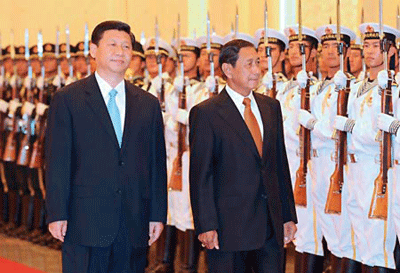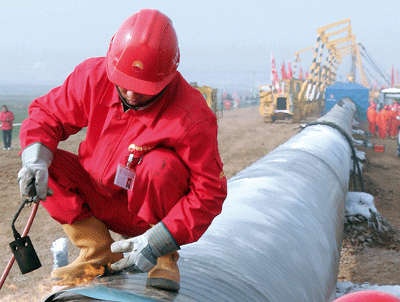Behind displays of friendship, Beijing is showing signs that it is losing patience with Burma’s politically inept ruling generals
When Vice Snr-Gen Maung Aye, the second most powerful figure in Burma’s ruling junta, led a high-level delegation to Beijing in mid-June, China’s state-run Xinhua news agency dutifully reported that the visit—the general’s third in six years—was aimed at strengthening friendly and cooperative ties between the two neighboring countries.
 |
| Chinese Vice President Xi Jinping, left, holds a welcoming ceremony in honor of Gen Maung Aye, right, vice-chairman of Burma’s ruling junta at the Great Hall of the People in Beijing on June 16, 2009. (Photo: www.english.cpc.people.com.cn) |
Behind the scenes of the outwardly amicable visit, however, the story was not so simple. According to businessmen close to the regime in Naypyidaw, before departing for Beijing, Maung Aye complained that China was meddling in Burma’s affairs. A former commander of the Burmese army’s northern region who once fought several fierce battles against the Chinese-backed Communist Party of Burma in the 1970s and 1980s, Maung Aye has never really trusted Beijing. Now, he grumbled, Chinese leaders were trying to tell Naypyidaw how it should deal with Aung San Suu Kyi, who was facing imprisonment on charges of violating the terms of her house arrest.
On the Chinese side, too, feelings were far more ambivalent than the Xinhua report would have us believe. Since the 2004 ouster of former Prime Minister Gen Khin Nyunt, Beijing’s relations with the Burmese regime have been on a less secure footing. Unlike the relatively open-minded Khin Nyunt, the current leadership in Naypyidaw consists entirely of dyed-in-the-wool xenophobes. Even a friendly word of advice was likely to strain the relationship carefully built up over the past two decades.
In the end, Maung Aye’s visit passed without incident. Although Beijing had earlier joined Burma’s other neighbors in calling for the release of Suu Kyi, and Chinese Premier Wen Jiabao told the Burmese regime’s No 2 that he hoped the military would help to promote democracy in Burma, the pro-democracy leader herself was not mentioned directly in discussions between the two sides. Significantly, however, news of the international outcry over the trial of Suu Kyi aired on Beijing television during Maung Aye’s visit, perhaps sending a message that world opinion could not be ignored, even in Communist-controlled China.
Despite such subtle hints, however, it is clear that Beijing is not about to depart from its long-held policy of noninterference in Burma’s political affairs—a policy that it has maintained even under more trying circumstances.
 |
| Chinese workers seal the pipeline along the 1,272-kilometer transnational natural gas pipeline in Luoyang in central China’s Henan Province on Dec 11, 2008. China’s demand for oil and gas has expanded rapidly in recently years to fuel its double-digit economic growth, as the country imported nearly 200 million tons of oil in 2007, up more than 10 percent from 2006. (Photo: AFP) |
When Burmese troops and security forces were killing monks on the streets of Rangoon in September 2007, provoking international outrage, Beijing made it clear that it wasn’t going to join in the chorus of criticism. Instead, it reacted by issuing an anodyne statement calling on all parties to exercise restraint—and for the rest of the world to mind its own business. Soon after the dust settled, the Burmese regime’s leader, Snr-Gen Than Shwe, returned the favor by sending an envoy to Beijing to explain the situation. And so the whole episode was reduced to a mere bump in the road of Sino-Burmese relations.
It came as no surprise, then, that when a Burmese court sentenced Suu Kyi to a further 18 months under house arrest on August 11, Beijing did not deviate from its script.
“International society should fully respect Myanmar’s [Burma’s] judicial sovereignty,” said a spokesperson for the Chinese foreign ministry, adding that Beijing would not back any calls for UN action against the Burmese regime.






